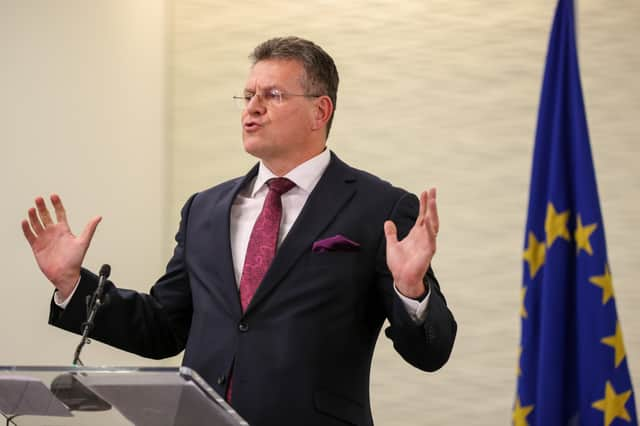NI Protocol: new legislation on unimpeded flow of medicines set to be announced by EC vice president Maros Sefcovic


European Commission vice president Maros Sefcovic is expected to announce proposed new legislation at a press conference later today.
The UK’s Brexit Minister, Lord Frost, is understood to be aware of the development and is also expected to make a statement.
Advertisement
Hide AdAdvertisement
Hide AdBBC News NI economic editor John Campbell predicted it would be a “big day” for the NI Protocol.
He commented on social media: “The UK is signalling that it’s prepared to soften its demands on the ECJ & the NI Protocol, acknowledging the ECJ’s role in interpreting EU law. This opens the door to drawing on the governance arrangements in other EU deals, eg Ukraine.
“The UK is also prepared to take a staged approach to working through Protocol issues with the initial focus on the most pressing practical issues.
“The UK thinks that on the practical issues the EU has not moved very much – apart from on medicines – from its October positions but is hoping that there can be better engagement on this early next year.
Advertisement
Hide AdAdvertisement
Hide Ad“The EU is going to publish its medicines proposal and start the process of changing its laws in this area. It advances on the October proposals and while the UK has not agreed to it they see it as a positive step.
“It’s understood to include a proposal for that some new drugs the MHRA could approve use in NI ahead of an EMA approval.
“In terms of deadlines the intention would be to reach agreement well in advance of May’s NI Assembly election but the early weeks of next year will be the ‘clarifying’ period when it will become clear if a deal is do-able.
“The UK still thinks it’s July command paper is the best way forward but short of that the kind of test it’s aiming for is: would the new arrangements convince a GB trader who has stopped sending to NI to restart?”
Advertisement
Hide AdAdvertisement
Hide AdThe issues surrounding medicines stem from the outworkings of the Northern Ireland Protocol, a part of the Brexit deal which means Northern Ireland remains covered by the EU’s pharmaceutical regulations.
As Northern Ireland receives most of its medicines from suppliers in Great Britain, there had been concerns that their movement could be impeded when a grace period expires.
That grace period was originally due to end in January but in the autumn the UK extended it unilaterally – along with other temporary exemptions associated with the protocol – pending efforts to find negotiated solutions to the issues.
The anticipated EU announcement would include a proposal to pass legislation that will enable the trade of medicines between Great Britain and Northern Ireland to continue.
Advertisement
Hide AdAdvertisement
Hide AdA Brussels source said: “We believe the proposals solve all the issues that were raised about medicines.”
Any new legislation would be subject to ratification by both the European Council and the European Parliament.
Mr Sefcovic and Lord Frost are expected to speak by phone ahead of the announcement.
It is understood Lord Frost has asked to meet with Northern Ireland’s political parties on Friday, with party leaders anticipating a briefing on the development.
Advertisement
Hide AdAdvertisement
Hide AdIt is not expected that there will be a resolution to any other subjects, but there may be an indication from both sides on an approach to dealing with outstanding issues such as customs and food and plant and animal checks in the new year.
The proposed EU law change would allow GB-based pharma suppliers to maintain their current regulatory arrangements.
It would mean companies in GB could continue to act as a hub for the supply of generic medicines to Northern Ireland, without the need to establish bases in the region.
The proposals would also apply to other small markets which use British medicines, including the Irish Republic, Malta and Cyprus.
——— ———
A message from the Editor:
Advertisement
Hide AdAdvertisement
Hide AdThank you for reading this story on our website. While I have your attention, I also have an important request to make of you.
With the coronavirus lockdown having a major impact on many of our advertisers — and consequently the revenue we receive — we are more reliant than ever on you taking out a digital subscription.
Subscribe to newsletter.co.uk and enjoy unlimited access to the best Northern Ireland and UK news and information online and on our app. With a digital subscription, you can read more than 5 articles, see fewer ads, enjoy faster load times, and get access to exclusive newsletters and content. Visit https://www.newsletter.co.uk/subscriptions now to sign up.
Our journalism costs money and we rely on advertising, print and digital revenues to help to support them. By supporting us, we are able to support you in providing trusted, fact-checked content for this website.
Ben Lowry
Editor